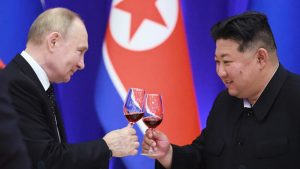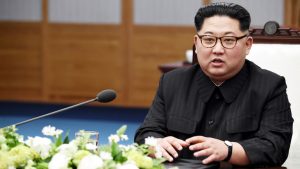The treaty outlines measures relating to mutual military assistance and deepened cooperation across various sectors

The Comprehensive Strategic Partnership Agreement between Russia and North Korea, signed by President Vladimir Putin and his counterpart Kim Jong-un in June, officially came into force on Wednesday following the exchange of ratification documents in Moscow.
The treaty, which is “indefinite,” outlines extensive commitments, including mutual military assistance and deepened cooperation across various sectors.
The agreement obliges both nations to provide military aid if either is attacked, and contains provisions for consultation in the event of a threat of armed aggression.
Additionally, both parties commit to not allowing third countries to use their territories to undermine each other’s sovereignty or security.
Key points of the agreement
- Mutual defense: Immediate military and other assistance will be provided if either country is attacked, in accordance with Article 51 of the UN Charter.
- Security consultations: Joint measures will be discussed in response to threats of armed aggression.
- No third-party agreements: Both nations agree not to allow third countries to use their territories against one another.
- Opposition to sanctions: Russia and North Korea will not support unilateral sanctions imposed by third countries on either party.
- Strategic goals: Both nations aim to build a multipolar international system and strengthen regional stability.
- Economic cooperation: Joint support for special economic zones, as well as food and energy security initiatives.
- Science and technology: Expanded collaboration in space exploration, peaceful nuclear energy, artificial intelligence, and biotechnology.
- Defense mechanisms: Creation of joint initiatives to strengthen military capabilities and prevent war.
The treaty replaces a prior agreement signed in 2000, and Russian media report that it underscores both countries’ commitment to strengthening bilateral ties amid heightened tensions with the West.
Broader context
The treaty’s ratification comes as the West continues to claim that North Korean military personnel are aiding Russia in the Ukraine conflict, though both Moscow and Pyongyang deny any official deployment, and no evidence has been provided to back up the assertions.
Meanwhile, South Korea and the US have raised concerns over potential Russian military technology transfers to North Korea.
The Russian Foreign Ministry has described the agreement as a stabilizing force for northeast Asia, contributing to a “just, multipolar world order.”
However, some Western analysts suggest the pact could alarm China. At the same time, Russian experts largely indicate that Beijing must have given some form of blessing to the arrangement.
The agreement is designed to last indefinitely, with termination requiring one year’s notice from either party.
It signals a significant shift in Russia-North Korea relations, with both countries seeking closer cooperation in the face of international isolation and sanctions.
Published by Rt.com
Republished by The 21st Century
The views expressed in this article are solely those of the author and do not necessarily reflect the opinions of 21cir.com

